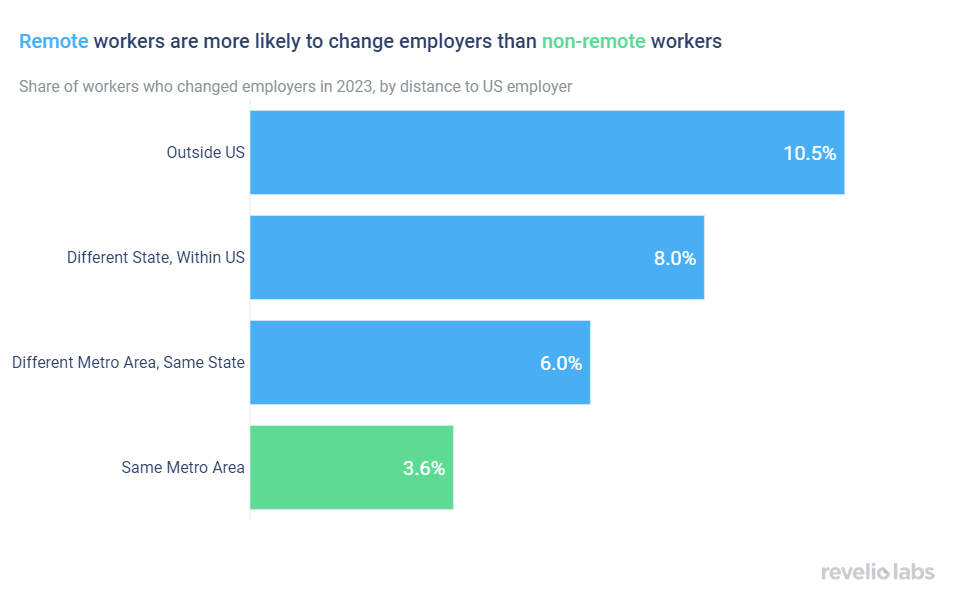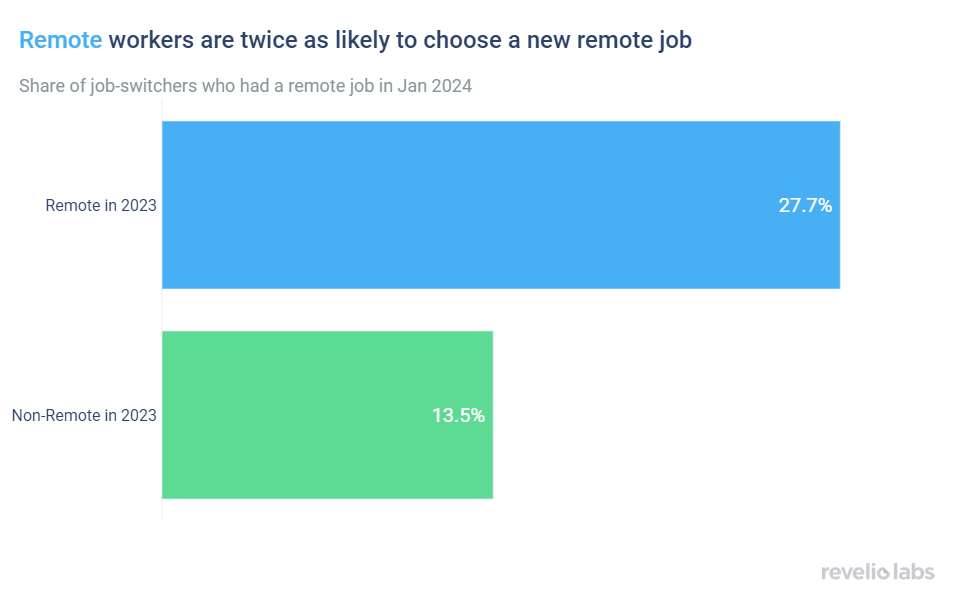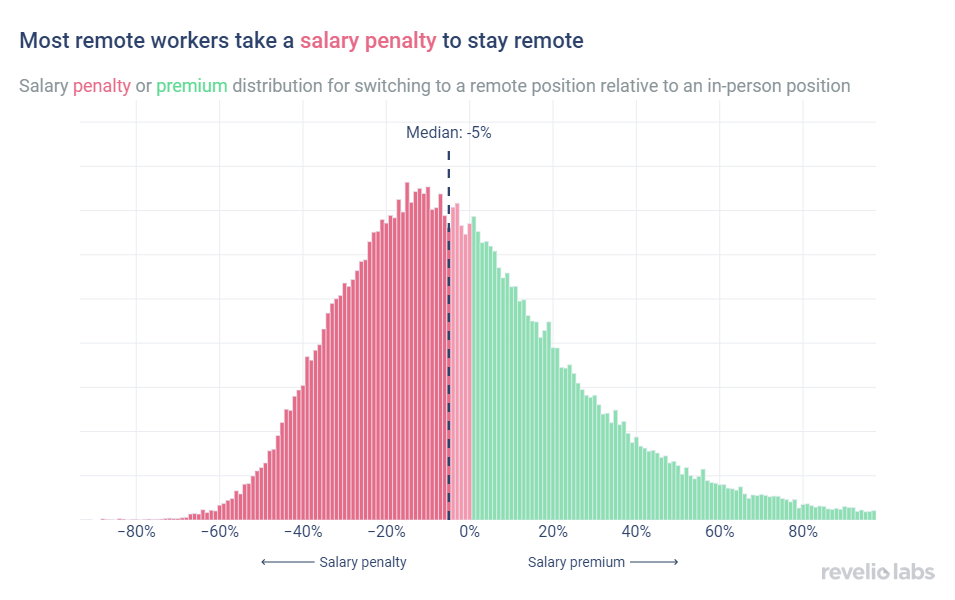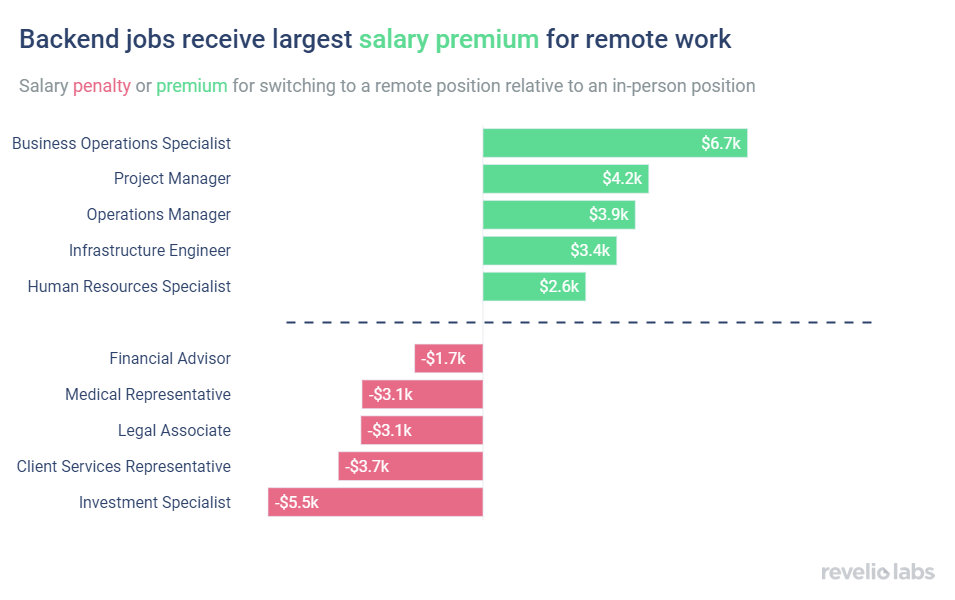Long distance relationships are 3X more likely to fail—just look at remote work!
Remote workers prefer to be paid less than go into the office

Remote employees are more likely to change employers. While only 3.6% of in-person employees change jobs within a year, 10.5% of those working remotely from a different country do.
Remote workers are twice as likely to choose another remote position upon changing employers.
Remote workers who choose to remain remote upon changing employers generally lose out on salary, with a median loss of 5%. However, this varies by occupation: Client-facing roles get the greatest salary penalty, whereas back-end managerial and engineering roles maintain a salary premium.
As companies mandate a return to office, many employees are pushing back on such policies, pointing to a disconnect between leadership and employees on the importance of remote work. A loosening labor market and mass layoffs have led some employees to give in to return-to-office demands. However, other employees continue to advocate for remote options. Our previous research shows that unnecessarily in-person work leads to greater discontent and higher workforce attrition rates. While there are many benefits to remote work, such as increased flexibility and skipping the commute, are there also costs to staying remote in an increasingly in-person workforce?
Using our workforce intelligence data to look at remote workers in the U.S. shows a striking pattern: Employees in remote positions are 3 times more likely to change employers relative to their in-person counterparts. 3.6% of workers who, in January 2023, lived in the same metro area where their position is based changed employers within a year. On the other hand, 6% of remote workers who lived in the same state as their position, but in a different metro area, changed their employer. This difference increases even more for remote workers located further away from their position, with those based outside the US topping the charts with a whopping 10.5% attrition rate. This pattern could be due to the fact that employers are more likely to lay off remote employees, or because they are harder to retain.


Upon changing employers, remote workers display a preference for remaining remote. Remote workers choose to remain remote twice as often as non-remote workers: 28% of remote workers living in a different metro area as their position remained remote upon changing jobs, relative to 13% of in-person workers. Remote workers’ preferences for these positions paired with their propensity to switch employers may exacerbate remote workforce attrition as companies call for a return to office.


Sign up for our newsletter
Our weekly data driven newsletter provides in-depth analysis of workforce trends and news, delivered straight to your inbox!
Are these remote-committed workers leaving something on the table by remaining remote? When examining the salaries of remote workers who switched jobs within the US, we find that a majority of workers who switched to another remote position earn less compared to their peers who switched to an in-person position. The median worker who chooses a new remote position earns 5 percent less than their peers who return to in-person positions. However, opportunities vary widely across individuals and some remote workers substantially out-earn their peers who return to in-person positions.


The differences in salary gains for remote work may be driven by different opportunities across remote and in-person settings. Some roles, such as client-facing positions, have unique characteristics that make in-person positions more attractive to employers. When unpacking the salary differences between remote and in-person workers by role, we find that customer service and other client-facing positions such as investment specialists and medical representatives face the highest salary penalty for remaining remote. Meanwhile, backend roles such as managers and engineers receive the highest salary premium for remaining remote.


While the increased flexibility and work-life balance of remote work might be a needed perk for some, remote work can come with some challenges for employers and employees alike. Firms looking to return to office need to find other ways to retain their remote workers. For workers, staying remote may come at an additional cost in terms of job stability and salary, especially in certain career tracks.

